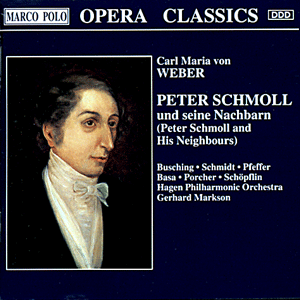Peter Schmoll is a charming and delightful work largely
unknown, particularly outside Germany. On listening to it one is distinctly
aware of a style which could be identified as a lighter brand of Mozart.
The work is in fact a brilliant attempt at opera composition by a fifteen
year old who went on to write Der Freischütz - an opera widely
performed to this day.
To help give a clearer picture of the work's style
we need to delve into the background of this composer. Today, Weber
is widely known for his Invitation to the Dance and Clarinet
concertos, but less so for his operas Euryanthe and Oberon,
his two symphonies and piano concertos.
Carl Maria von Weber's interest in theatre music
stems from his background. His father ran a travelling German theatre
company, which was responsible for providing festival and formal occasion
music. Also, his uncle's daughter, Constanze, was married to Mozart
(1792) and so Weber was closely exposed to Mozart's compositions. Coupled
with this he was given music lessons by the brother of Joseph Haydn
whilst in Salzburg. Hooked by opera he had written his first essay in
the genre before the age of fifteen (The Power of Love and The
Forest Maiden). Under Haydn's watchful eye, Weber composed Peter
Schmoll to a plot taken from a novel by Cramer, a popular writer
of the day. However, the librettist made a poor job of adaptation and
provided a lifeless plot with some sloppily rhymed lyrics. In an attempt
to rescue the good music and give the opera an airing a more recent
adaptation was undertaken by Hasse (1944). In 1963, Peters published
a new edition with new dialogue by Werner Göttig. This is based
on the essence of the original and with the song lyrics this time left
untouched. It is this version with the dialogue (abridged) that is used
for the Marco Polo recording.
Briefly, the plot concerns two friends who lose touch
with each other in the turmoil of a revolution. After a series of subplots
they find each other again and live happily ever after.
The music in this opera is much lighter than many of
the operatic compositions that were to follow. There is a freshness
to the music with good construction and orchestration. A flavour of
Mozart and Schubert can be traced in this early output of Weber. Try
the opening trio [tk.2 from 30" in]. And later, a charming duet used
a catchy rippling woodwind with strong rhythm with the horns to nicely
complement the vocal line [tk.8]. The short finale [tk18] is well constructed
and has themes skilfully knitted.
The music is delightfully fresh and deserves this revival,
thanks to Marco Polo. Weber is not short of ideas, and his arias will
often embrace a number of charming melodies and motifs. (CD2 tk.15 provides
a good example of this and also includes the main theme of the overture.)
The soloists are strong and blend well in the many duets and trios that
form the framework to the score.
To fully appreciate the dialogue and follow the plot
one needs to understand German since there is no translation in French
or English. The dialogue which punctuates the musical numbers is fortunately
short (averaging 18s) and does not detract from the listening unduly.
Although I don't speak German this limitation has not prevented me from
thoroughly enjoying the CD set.
The notes in English, German and French are detailed
and give a good background to the writing of the opera.
Raymond J Walker


